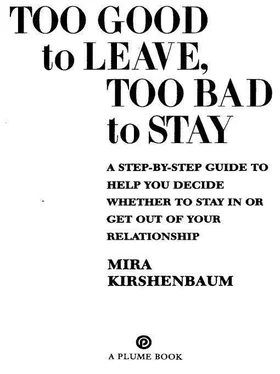Kirshenbaum, Mira - Too Good to Leave, Too Bad to Stay
Здесь есть возможность читать онлайн «Kirshenbaum, Mira - Too Good to Leave, Too Bad to Stay» весь текст электронной книги совершенно бесплатно (целиком полную версию без сокращений). В некоторых случаях можно слушать аудио, скачать через торрент в формате fb2 и присутствует краткое содержание. Жанр: Психология. Описание произведения, (предисловие) а так же отзывы посетителей доступны на портале библиотеки ЛибКат.
- Название:Too Good to Leave, Too Bad to Stay
- Автор:
- Жанр:
- Год:неизвестен
- ISBN:нет данных
- Рейтинг книги:3 / 5. Голосов: 1
-
Избранное:Добавить в избранное
- Отзывы:
-
Ваша оценка:
- 60
- 1
- 2
- 3
- 4
- 5
Too Good to Leave, Too Bad to Stay: краткое содержание, описание и аннотация
Предлагаем к чтению аннотацию, описание, краткое содержание или предисловие (зависит от того, что написал сам автор книги «Too Good to Leave, Too Bad to Stay»). Если вы не нашли необходимую информацию о книге — напишите в комментариях, мы постараемся отыскать её.
Too Good to Leave, Too Bad to Stay — читать онлайн бесплатно полную книгу (весь текст) целиком
Ниже представлен текст книги, разбитый по страницам. Система сохранения места последней прочитанной страницы, позволяет с удобством читать онлайн бесплатно книгу «Too Good to Leave, Too Bad to Stay», без необходимости каждый раз заново искать на чём Вы остановились. Поставьте закладку, и сможете в любой момент перейти на страницу, на которой закончили чтение.
Интервал:
Закладка:
But a pattern of constantly forgetting agreements can be toxic and deadly. If your partner always ends up forgetting the agreements he’s made, maybe not immediately, but eventually, then before you know it you can find yourself completely withdrawn from this person. Then you don’t make love because you’re too angry. You don’t do anything together because you can’t count on your partner being there. You can’t talk about anything because what’s the point if any real conclusion and decision will end up being forgotten. Memory keeps things real. Forgetting turns things into air. Forgetting in a relationship turns the relationship into air.
And you can’t allow yourself to be made the bad guy just because your partner presents his forgetting as a way of being relaxed.
Another way people have of breaking agreements is that they don’t think keeping the agreement matters. This can be amazing to you if you’ve worked hard to set up the agreement in the first place. Finally, after weeks of fighting, the two of you agree that your partner will stop spending money unless he talks about it with you first. Then the very next day, seemingly deliberately, he goes out and buys himself a Burberry raincoat without discussing it first.
And guess what happens to make him think the agreement doesn’t matter to you? He walks in the door and you tell him how nice he looks. Maybe you forgot the agreement. Maybe you’re afraid of seeming petty. Maybe after all the fighting that went into setting up the agreement you’re sick at the thought of fighting to keep the agreement.
Maybe there are no consequences to keeping the agreement because every single time there are so many “exceptions” that the agreement never quite applies. Your partner promised he’d spend a full twenty minutes with foreplay every time you make love. And he’s telling you he’s actually keeping the agreement even though he’s never kept the agreement. And that’s because one night it’s late and you’re both tired, and the next time you’re rushed because you’re afraid the kids are going to wake up, and the next time he’s just so horny he can’t help himself, and on and on.
The point is that without consequences agreements don’t matter. And if you’re sick of fighting to set up an agreement in the first place, then you’re not going to fight to make sure that the consequences happen if the agreement is broken and so there won’t be any consequences when the agreement is broken and the agreement will make no difference and you won’t get your needs met.
Another way agreements get broken is through misunderstandings. “I didn’t realize that when you said twenty minutes of foreplay that didn’t include my getting on top of you and putting my penis in your vagina.” “I thought when you said we had to discuss the money I wanted to spend that didn’t include, you know, spending money on necessities or stuff for the house or the kids or sums less than five hundred dollars or ...” “I didn’t realize that when you said you wanted me to take out the garbage without your reminding me that you meant every single time.”
Surely these are not the kinds of things you end a relationship over, are they? Not one at a time. But they are the kinds of things that destroy a relationship when they happen over and over, and form a pattern, and make you feel that having needs, much less thinking of getting them met, is a waste of time.
4. “We’re Very Polite with Each Other”
Here’s another sign that it’s just too hard to get your needs met. I don’t want to knock politeness. It’s missing from too many relationships. Politeness can be heaven. But it can be the very stuff out of which relationship hell is made, too.
What do you think happens to people in a relationship when they’re furious and exhausted from pointless fighting, broken agreements, and unmet needs?
You just stop trying to arrive at agreements. It looks like politeness but it’s really despair wearing the mask of politeness. He does whatever he wants with money and you don’t say anything. You hate him more than ever, but it might look to an observer as though things were better than ever. Your needs don’t get met when it comes to sex, but it’s been so hard to talk about it, and the talk never adds up to anything anyway, that you are led to a situation where you politely refrain from sex. And since it’s rude to argue over garbage, you just take it out yourself, and feel you’re trapped in a relationship with someone who’s destroyed your dreams.
So if your despair over negotiating solutions is so great that your relationship has been turned into an empty desert of politeness, where you’re unwilling to even ask for what you want, then you already see how unlikely it is that you can get your needs met.
When Enough Is Enough. These then are the four mechanisms that make people feel it’s just too hard to get their needs met. Let me briefly summarize them:
1. “I can do whatever I want, right?” Your partner’s making unilateral moves: doing what he wants when he wants it by himself without talking to you about it.
2. “It’s such an ordeal talking about the littlest thing.” This is when negotiating solutions together is virtually impossible. Here’s what makes it impossible:
• You can’t listen to each other or understand what the other is saying, because you feel furious and deprived or because your partner is a bad communicator or because you’re exhausted and overwhelmed.
• You’re scared to death you’re going to lose, because your partner’s a dirty fighter or because your partner’s limited.
• You’re afraid of being attacked, because your partner’s a “historian” and hooks everything you bring up into the past or because you’re constantly criticized when you have a need.
• You’re afraid of conflict and struggle, because every single negotiation in the past has ended in disaster, or because your partner’s a nut and the stress of negotiation either depresses her or makes her feel she’s got to threaten to leave or because there are specific stumbling blocks that you bang into two minutes into any negotiation.
3. “You never do what you say you’re going to do.” This is where the issue of trust comes up in relationships. When people make agreements and then break them, the relationship is not only a place of fighting and deprivation, it’s a place of betrayal.
4. “We’re very polite with each other.” This is what happens to people in a relationship when they’re furious and exhausted from pointless fighting, broken agreements, and unmet needs. There’s no fighting, there’s just despair.
If the four mechanisms I’ve just outlined exist in your relationship, then it’s likely that guideline #30 does apply to you.
GUIDELINE #30
If you’ve lost hope that you’ll be able to get a reasonable need met without a too-painful struggle to arrive at a solution, then I feel comfortable saying you’ll be happy if you leave and unhappy if you stay. Quick take: Frustration, fear, and deprivation are nature’s way of telling you that this relationship is not your home.
The four mechanisms listed before this guideline show you what would bring you to the point of losing hope that you can get reasonable needs met or do so without a too-painful struggle. What you have to do is see whether these need-destroying mechanisms actually exist in your relationship and then determine for yourself whether you’ve actually given up hope. That’s the key to this guideline.
The fact that you’ve stayed in an iffy relationship only means you’ve accommodated to whatever level of deprivation exists. You can’t look at the fact that you’ve stayed and assume that that by itself means you still have hope. Don’t let your actions mislead you about what you really feel. What looks like an action might only be inertia.
Читать дальшеИнтервал:
Закладка:
Похожие книги на «Too Good to Leave, Too Bad to Stay»
Представляем Вашему вниманию похожие книги на «Too Good to Leave, Too Bad to Stay» списком для выбора. Мы отобрали схожую по названию и смыслу литературу в надежде предоставить читателям больше вариантов отыскать новые, интересные, ещё непрочитанные произведения.
Обсуждение, отзывы о книге «Too Good to Leave, Too Bad to Stay» и просто собственные мнения читателей. Оставьте ваши комментарии, напишите, что Вы думаете о произведении, его смысле или главных героях. Укажите что конкретно понравилось, а что нет, и почему Вы так считаете.












